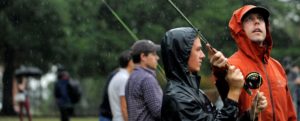When Assistant English Professor Jon Pineda decided to plan a fly-fishing lesson for literature students outside Combs Hall, he’d faced the facts. There would be no actual fish – or for that matter, water – on the green Jefferson Square lawn. The forecast that late-summer day proved him wrong.
The rain steadily poured while 15 students, many clad in rain jackets and slickers, lined up in the grass on the Fredericksburg campus. Over the sound of squeaky rain boots and fishing lines whipping through the air, Pineda celebrated each successful cast.

“I just imagined my students out on Jefferson Square, that was always the vision,” said Pineda, who invited two fishing experts from Orvis sporting goods store to teach students in his Ecoliterature class how to fly fish. “We can talk all day long about fly fishing, but there’s something about actually holding the rod.”
In a two-part lesson, the Orvis fishermen, Mark Fackner and Aaron Spicer, instructed the students about fly patterns and the ecology of the river. Then, the novice student fishermen got to experience casting a fishing rod for themselves.
Fackner and Spicer taught the class two casts: false casting and the pick up and lay down. While some students got the hang of it immediately, many first timers struggled with technique. Quick to sense their frustration, Pineda—an avid fisherman himself–jumped in to help.
“I’ve fished in so many conditions,” said Pineda. “This is what it’s all about.”
This 300-level literature course with a focus on nature and the environment was a dream class for Pineda. He hoped to provide his students with some hands-on experience to help them connect with their writing.
“Writers use their imagination when constructing narratives, of course, but having firsthand knowledge of the thing they’re describing often gives them a relevant starting point and can also help create additional opportunities for the scope of the piece,” said Pineda, an acclaimed writer and poet, who is a finalist for the 2016 Library of Virginia Literary Award. “Writers can choose specific, essential details that build more authentic imagery, which often lends greater credibility to the voice of the narrative.”
That’s just what happened while writing his novel Apology. At the time, he also worked for a telecommunications company where he had to learn to climb 35-foot telephone poles.
“I decided my protagonist would go through similar training, and so I wrote those parts into the story,” said Pineda, about the book that won the 2013 Milkweed National Fiction Prize.
First-timer sophomore Sally Marrazzo could relate as she cast her line high into the air. “I think this experience will benefit my writing in this class,” she said. “Even though we are all novices it’s given us a better understanding.”
That’s just what Pineda wanted to hear. He’s loves to learn new things and hopes to spark the same curiosity within his writing students.
“The reason I teach is because I want students to find their voice and find their way,” said Pineda, recipient of the University’s 2016 outstanding young faculty member award. “I’m simply helping them find who they’ve always been.”





I knew a professor of physics who would take students fishing, outside of regular classroom hours, of course. Fly fishing is a skill that takes a lifetime to master. Exposing students to it not only lends authenticity to their voices, but is preparation for life’s many frustrations.
Nice article. Combination of story and teaching. Interesting, helpful and easy to understand. Thanks for the article.